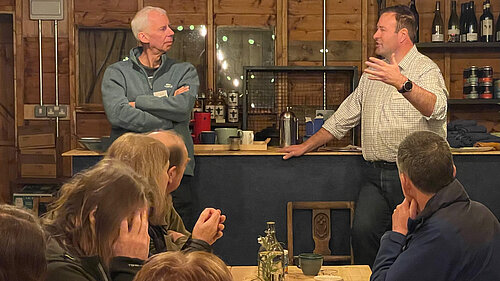Horsham Lib Dems host Sussex farmers to learn about the Lib Dem approach to farming

Farmers from across Sussex came together at Trenchmore Farm near Cowfold to discuss the Lib Dem approach to farming and rural communities with Stuart Roberts, the party’s national spokesman and former deputy president of the National Farmers Union (NFU).
On Tuesday 6th of February, a wide range of farmers from across Sussex came together at Trenchmore Farm near Cowfold, to discuss the Lib Dem’s approach to farming. The event was led by John Milne, the Lib Dem Parliamentary Candidate for Horsham, together with Stuart Roberts, the party’s national spokesman and former deputy president of the NFU.
As a farmer himself, Stuart has a first-hand grasp of the issues:
“Too often we have placed our farmers in a position where they have been asked to make a binary choice between producing food or delivering for the environment. This is a false choice and we must support UK farmers to deliver both these outcomes in harmony. Our overriding policy objective to to support a progressive, forward looking agriculture sector that can produce affordable, nutritious food and at the same time deliver the environmental outcomes that are needed from the countryside.”
One of the issues discussed was the challenges of fairness in food supply chains. For too long the balance of risks and rewards in food supply chains has been out of kilter with farmers owning the majority of risks and the rewards being received by those further upstream.
Stuart continued:
“I have always been clear that you can’t write a farming policy in isolation and as such I have always been clear that we must have a combined food and farming policy. For too long we have not prioritised the importance of food production in this Country. Our farmers produce some of the most sustainable food in the world and it is vital we support them in future. It is critical that we properly address fairness in the supply chain to ensure our food producers are better rewarded for the risks they carry on behalf of the entire food system.”
A lively Q&A session followed, with much talk about how local planning and infrastructure could support local farmers and food producers.
Stuart Roberts farms 120 hectares in Hertfordshire in partnership with his wife. A third generation arable and livestock farmer at Hammonds End Farm, Harpenden, Stuart has also worked for Defra and the Food Standards Agency and held senior management roles within the meat supply chain.
He formerly held the post of National Farmers Union Deputy President, after serving two years as Vice President. He now chairs the Liberal Democrats’ newly formed Food and Farming Working Group who recently authored the party’s farming policies and will be heavily involved in the General Election Manifesto in relation to food, farming and the environment.
Stuart laid down the challenge for government:
“For too long the Conservatives have taken our farmers and rural communities for granted. The lack of support for productive farming, the damage that come from their irresponsible trade deals and they lack of support for our tenant farmers will all impact on our vital rural communities. Like others, we know many in the countryside are feeling politically homeless and we believe the Liberal Democrats have an attractive offer for farmers, consumers and environmentalists as we seek to support a progressive agriculture sector that can deliver for food, climate change, biodiversity and the iconic British Landscape .”
Read more:
